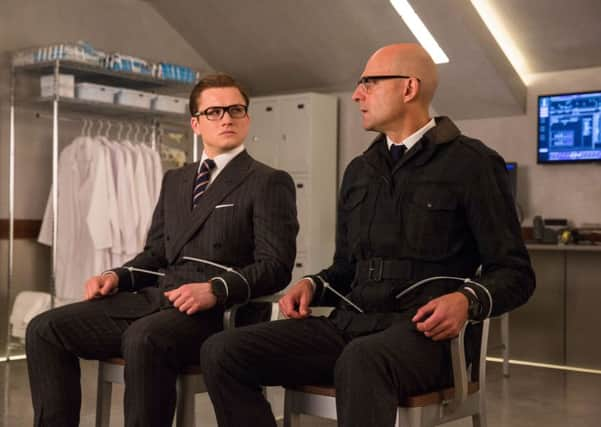Film reviews: Kingsman: The Golden Circle | Borg vs McEnroe


Kingsman: The Golden Circle (15) **
Borg vs McEnroe (15) ***
Based on the Mark Millar comic book series of the same name, the first Kingsman movie was a delirious blast of demented action cinema that put an entertainingly subversive, sometimes crazy, sometimes crude spin on the spy genre in an age in which Bond and Bourne had made it super-serious. Director Matthew Vaughn’s decision to cast Colin Firth as a sort of dapper, dangerous fusion of Patrick Macnee in The Avengers and Wolverine at his most kill-crazy was the sort of eccentric, esoteric touch that distinguished it from its Hollywood competition and helped make it a huge box-office hit.
That penchant for weirdness is still very much present in Kingsman: The Golden Circle. Once again directed by Vaughn, from a script by regular collaborator Jane Goldman, it’s a film, after all, that features Julianne Moore as the sort of world-domination-seeking super-villain who minces her henchmen not her words and keeps a kidnapped Elton John around as a pet, just because she can. But it’s also the sort of sequel that bloats the running time to a ridiculous degree – not just with repetitious action sequences, tedious exposition and groan-worthy attempts to shock, but with endless-seeming set-ups for a big-name American cast that Vaughn proceeds to keep on ice (literally in Channing Tatum’s case), presumably in preparation for a third film.
Advertisement
Hide AdTo begin with, though, we’re reintroduced to Taron Egerton’s chav-turned-gentleman-spy Eggsy. At the end of the first film, he’d gone through his My Fair Lady-riffing transformation to become a fully-fledged member of the titular secret service operation; this one drops us, Bond-style, into the midst of a big set piece involving a former rival and a ludicrously violent and over-the-top punch-up in the back of a speeding cab. Vaughn wastes no time establishing the cartoonish tone: limbs are ripped off with comic glee and the laws of physics are abandoned with an over-reliance on CGI. It makes for a fun spectacle, but it also feels like watching someone play a video game with all the cheat codes on: everything comes a bit too easily for Eggsy and there’s no real sense of threat.
The film continues in much the same vein. Operating out of a Cambodian temple decked out with 1950s kitsch Americana, Moore’s delightfully unhinged Poppy may unleash plenty of death and destruction in her bid to hold the world to ransom, but there’s such a plethora of death-defying gadgetry on hand it barely comes as a surprise when Colin Firth’s demise in the first film proves no barrier to his taking top billing in this one. He makes his return after Eggsy and Mark Strong’s Scottish-accented Merlin are forced to seek help from their US counterparts, “Statesman” – a rag-tag group of highly skilled Southern hicks who fetishise Stetsons and bourbon the way Kingsman operatives fetishise brogues and martinis. Led by Jeff Bridges, its star operative is played by the aforementioned Tatum, who goes by the alias Tequila, but exits the film almost the moment he enters. Similarly underused is Halle Berry as a Q-style tech-support called Ginger Ale who even complains about never being allowed to participate in the action. Given Berry’s own Bond history, that could have been a sly acknowledgment of the rubbish roles women in movies like this frequently get, but it’s a point rendered redundant by the film postponing any agency for her character to some future instalment.
Instead, the plot’s diversion to the US feels like a convenient way for Vaughn to include lots of culture-clashing comedy, not to mention a comically ruthless president (played by Bruce Greenwood) who’s only too happy to exploit the flaw in Poppy’s diabolical plan for his own political ends. Atypically for Vaughn, however, it all feels a bit unfocused, as if he’s fallen into the very franchise traps that this series seemed like it was going to avoid. As it piles on more and more nods to the ridiculousness of Roger Moore era-Bond, it feels less an affectionate parody and more like a way of peddling something that’s forgotten how to deliver a proper buzz.
It’s not often that Shia LaBeouf is the best thing in a movie, but in Borg vs McEnroe he’s well cast as John McEnroe, the one-time enfant terrible of American tennis who set-out to stop the preternaturally cool Swede Björn Borg (Sverrir Gudnason) from winning his fifth Wimbledon title in a row in an epic five-set showdown in 1980. The film is built around that final and the build up to it, and though it’s ostensibly about both players, director Janus Metz weighs the drama in Borg’s favour, turning the film into a psychodrama about a player wrestling with the toll taken by constantly burying his emotions for the sake of success. It’s not the most scintillating side of the rivalry and Gudnason, who looks eerily like Bjorg, never really gets under his character’s skin in a way that suggests there’s much more to him than a hyper-focused professional who learned early on that the only way he could fulfil his desire to be the best player in the world was to channel everything into the game. LaBeouf, however, brings the film alive whenever he’s on screen and, thanks to some CGI augmentation, the tennis looks convincing enough. If there’s a major fault it’s the way the film suggests McEnroe had to change his attitude a bit before he became truly great. But, of course, tennis didn’t change him. He changed tennis.